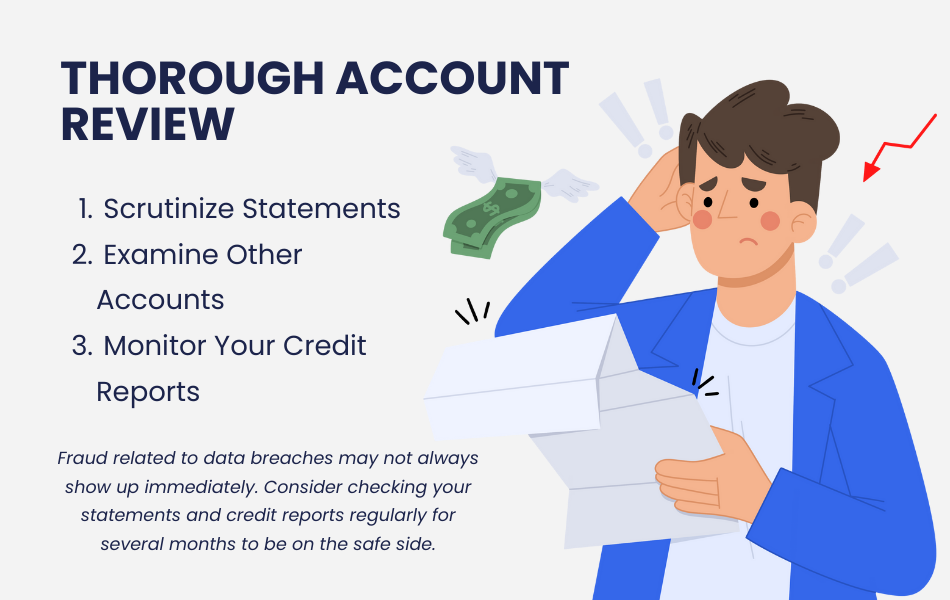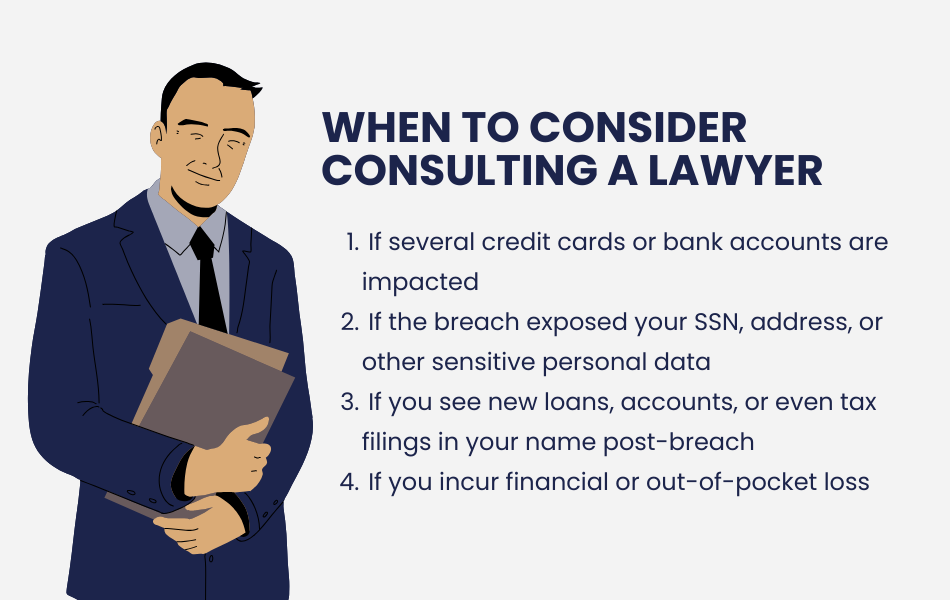Sadly, credit card data breaches have become an all-too-common occurrence. In 2022, there were 1802 reported data breaches in the United States, exposing over 422 million individual records. These breaches can leave you with fraudulent charges, a damaged credit score, and the lingering fear of identity theft.
While alarming, it’s crucial to remember that taking immediate action can significantly reduce the fallout from credit card data breaches. This guide will walk you through the essential steps to protect yourself and minimize the damage if your credit card information has been compromised.
Ready to take charge of the situation? Let’s dive into the specific actions you need to take right now.
Steps You Have To Do After a Breach Alert
Discovering that your credit card data has been exposed in a data breach can be alarming. However, taking decisive action quickly can help limit the damage. Here’s a detailed breakdown of what to do:

1. Contact Your Bank/Issuer
- Report It: Notify your bank or credit card issuer immediately. Search “[Bank Name] data breach hotline” for the quickest way to contact them.
- Cancel the Card: Your issuer will promptly cancel the compromised card, minimizing potential fraudulent use, and issue a new one with a different number.
- Zero Liability: Most card issuers have zero liability policies. Still, confirm with your bank that you won’t be held responsible for unauthorized charges. This provides peace of mind.
Example: Imagine you receive an alert that your credit card was used at a store you’ve never visited. Immediately call your bank — they’ll likely confirm this as fraudulent activity, cancel your card, and work with you to address the charges.
2. Dispute Fraudulent Charges
- Bank’s Process: Your bank will guide you through disputing fraudulent charges. Be prepared to provide details like the date, amount, and merchant involved in unauthorized transactions. Some banks may also request a police report for larger fraud cases.
- Act Fast: The sooner you dispute fraudulent charges, the higher your chances of a full reversal. Federal laws provide some protection, but banks often have their own deadlines for reporting fraud.
3. Change Passwords
- Protect Your Accounts: If you used the compromised credit card on any websites (shopping, subscriptions, bills), change the passwords on those accounts immediately. Don’t just update the stored payment method!
- Unique Passwords: Avoid reusing the same password across different sites. This limits the fallout if one site is breached. A password manager can help you create and store strong, unique passwords.
Important: Remain vigilant even after taking these steps. Monitor your credit card statements closely for weeks after the breach, watching for any unusual activity.
Thorough Account Review: Uncover Hidden Fraud After a Credit Card Data Breach
After the initial alert and card cancellation, it’s vital to thoroughly check your accounts for any lingering signs of misuse. Proactive review can help you catch even subtle fraud attempts.

1. Scrutinize Statements
- Pay close attention to small, seemingly random charges. These could be test charges made by fraudsters to see if your stolen credit card details work.
- Review statements from at least a few months before the data breach alert to help pinpoint when the compromise might have occurred.
2. Examine Other Accounts
- Review any recurring subscriptions or bills that may have been linked to the compromised card. Update your payment information on those accounts immediately to prevent fraudulent payments.
- Check your bank and non-financial accounts (like online stores) for any unfamiliar login activity. This could be a sign of wider identity theft attempts related to the data breach.
3. Monitor Your Credit Reports
- Fraudsters might try to open new credit lines in your name. These will show as “hard inquiries” on your credit reports, even if the account wasn’t ultimately opened.
- You’re entitled to free annual credit reports from each of the three major credit bureaus (Equifax, Experian, TransUnion). Visit https://www.annualcreditreport.com to get yours.
Important: Fraud related to data breaches may not always show up immediately. Consider checking your statements and credit reports regularly for several months to be on the safe side.
Options for Enhanced Protection: Safeguard Your Finances After a Data Breach
While initial steps help curb immediate fraud, it’s wise to explore these options for longer-term protection after your credit card data is compromised. Each tool has its pros and cons:
Fraud Alerts
- Types:
- Initial Fraud Alert: Lasts for one year, good for immediate protection after a breach.
- Extended Fraud Alert: Lasts for seven years, requires proof of identity theft.
Alerts are relatively easy to set up and remove. They offer protection without totally restricting access to new credit.
Credit Freeze
- Stronger Protection: A credit freeze essentially locks down your credit reports. New credit lines or accounts generally cannot be opened without you specifically ‘thawing’ your reports first.
- Trade-off: While a freeze offers the strongest safeguard against new account fraud related to the breach, it can be inconvenient. You need to unfreeze beforehand whenever you legitimately need to apply for credit (a loan, new card, etc.).
A credit freeze might be ideal if:
-
- You see signs of ongoing identity theft attempts beyond just your credit card
- The breach was severe, exposing additional personal data
- You don’t anticipate applying for new credit in the near future
Credit Monitoring Services
- Free Post-Breach: Companies often provide free credit monitoring after a breach. These typically focus on tracking your existing credit accounts for suspicious activity.
- Paid Subscriptions: More comprehensive services exist, offering features like:
- Dark web scans for leaked personal information
- Monitoring for your SSN being used in new applications
- Identity theft insurance for some financial losses
Free services are a good starting point. Decide if the features of paid subscriptions are worth the cost based on:
-
- Your perceived risk of further fraud after the breach
- The value you place on the convenience of these additional monitoring features
Important: Remember, no single option is foolproof. Combining measures (like an alert with monitoring) can offer a multi-layered defense. Staying vigilant with your accounts remains essential after any data breach.
When to Consider Consulting a Lawyer
While you can take many steps to protect yourself after a credit card data breach, seeking legal counsel becomes especially important in the following scenarios:

Complex Situations
- If several credit cards or bank accounts are impacted, it gets harder to track fraudulent activity, dispute incorrect charges, and potentially recover all your losses. A lawyer can streamline the process.
- If the breach exposed your SSN, address, or other sensitive personal data, you’re at higher risk of full-blown identity theft. An attorney can advise on proactive identity protection measures and help if your data is misused
Suspected Identity Theft
- If you see new loans, accounts, or even tax filings in your name post-breach, this signals a serious identity theft attempt. An attorney will guide you in filing police reports, disputing fraudulent activity in a legally strong way, and protecting your future credit.
Significant Financial Losses
- Even with zero liability policies, dealing with large disputed amounts on your credit card can be stressful. A lawyer can advocate for you with credit card companies and potentially seek compensation beyond what the bank might offer.
- The time and effort spent fixing damage from a breach can incur costs – things like paying fees to freeze your credit reports, notarizing documents for disputes, or hiring identity theft restoration services. A lawyer helps determine if you might be able to recover these costs from the company that was breached.
Important: Document everything! Keep records of fraudulent charges, communications with the breached company, costs incurred, any unusual credit activity, etc. This information will be vital if you pursue legal action.
How a Data Breach Lawyer Can Help
A data breach lawyer specializing in consumer protection brings a range of skills to advocate for you after your credit card (and potentially other personal data) is compromised:
Assessing Your Rights
Data privacy and security laws vary by state and type of breach. A lawyer can explain which laws apply to your situation and their implications for potential compensation.
They’ll examine if the company had adequate security measures in place and if their negligence directly contributed to the breach that exposed your information.
Seeking Compensation
A data breach lawyer understands how to negotiate with banks and credit card issuers to recover disputed fraudulent charges.
If you incurred significant losses beyond reversed charges, they can help file an individual claim against the breached company. For major breaches, a lawyer guides you through the process of joining a class-action lawsuit for potential compensation.
Navigating Disputes
Disputing fraudulent charges or correcting errors on your credit report due to the breach can get complex. A lawyer can represent you in these disputes.
If the breach leads to identity theft, a lawyer assists with the process of disputing fraudulent accounts or loans created in your name.
Protecting Your Future
They can advise on the best credit monitoring and identity protection services for your situation after the breach.
A data breach lawyer can help you take any additional legal steps (extended fraud alerts, stronger credit freezes) to safeguard yourself against ongoing identity theft risks.
Important: Even if you don’t currently see a need for a data breach lawyer, understanding your rights is crucial. At Heenan & Cook, we offer free consultations to empower you after a breach. Our attorneys can assess your situation and guide you towards the best course of action, minimizing potential damage.
Knowledge is power after a data breach. By understanding the steps to take and your potential rights, you can limit the damage and protect yourself financially. If the situation becomes complicated, don’t hesitate to seek the help of a data breach lawyer.
At Heenan & Cook, we understand the challenges you face. If you need help navigating the aftermath of a credit card data breach, contact us for your free consultation. Our experienced attorneys are here to protect your rights.